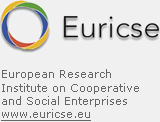International Conference
Institutions, networks and trust in European-russian relations
Organized by
European University Institute (Florence)
Florence, Italy, 26-27 March 2010
Conference theme
Institutions and networks in European-Russian relations: why their role in promoting trust should be discussed. In modern global political and economic relations there are many situations, when institutional trust is absent. The absence of mutual trust can badly affect existing institutionalized forms of cooperation turning them into dysfunctional, or even “virtual”. This situation is especially characteristic of contemporary Russian-Western, in general, and Russian-European relations, in particular. This absence of trust and resulting lack of cooperation, or even direct conflicts between Russia and its Western counterparts also negatively affect development of all New Independent States (especially, Ukraine, Georgia and Caspian region countries).
These issues are especially important since EU can be considered as a big area of well developed institutions and guaranteed institutional trust. However, the existence of big area of Russia and other New Independent States where institutional trust is not guaranteed poses many challenges, especially, for EU security, energy security and migration policies.
Therefore, it is proposed to discuss, whether there are means to increase trust in Russian-European relations. Can existing institutions be improved in order to increase their functionality? Can the absence of trust in European-Russian relations be partially compensated by different elite interpersonal networks, inter-group macro-configurations of networks or by technical networks (such as pipelines, in this case there is a strong mutual interdependence based on sunk capital)?
From the perspective of game theory (for example, Robert Axelrod's works) specific social structures can be needed for supporting more cooperative strategies, avoiding cooperation dilemmas and, therefore, for fostering trust. Much is done in IR on the role of institutions as such structures. EU’s traditional policy also constantly utilizes international institutions. But what about networks? Can they also be used, at least, partially, as trust-supporting structures in the situations when institutions are dysfunctional. Moreover, from the perspective of the concept of “embeddedness” developed in economic sociology and political science (Marc Granovetter, Robert Putnam) there should be specific combinations of networks for supporting institutions. Otherwise, institutions do not work well.
There is also a very close to proposed network approach argumentation inside the literature on European integration, for example, in Ernst Haas’ neofunctionalism (stressing the importance of regional interest groups and bureaucracy). The same approach was, de facto, originally applied by Jean Monnet to European integration. So, can existing combinations of network ties existing in European-Russian relations be improved in order to promote institutional trust?
Issues that are proposed for discussion
- Security dimension. How to overcome absence of trust in security relations between Euro-Atlantic countries and Russia (for example, the problems with the treaties on nuclear and conventional arms in Europe; forms of Russia-NATO cooperation; regional conflicts, such as in Georgia; cooperation in opposing new security threats such as terrorism or drug trafficking in Central Asia)?
- Energy security dimension. How to overcome absence of trust in energy security relations (for example, Russia’s objections against the principles of European energy charter; political and economical aspects of European dependence on Russian energy; Russia’s bad investment climate for EU corporations; contradictions on the issues of pipeline construction projects, mostly, South and Nordstream vs. Nabucco and Transcaspian projects)?
- Human dimension. How to really construct “common spaces”, for example, in the spheres of science, education and migration? For example, how to optimize the processes of “brain drain” from Russia to EU with the purpose of effective co-development? How to improve cooperation between Russian and European universities, academic and expert communities?
These three points represent the focus of the conference. However, network approach does not strictly differentiate between the issue and its environment. Therefore, it is proposed to discuss the problem taking into account two different environments: internal Russian and international one.
- Is the structure of social capital that has developed in Russia partially, or even fully inconsistent with promoting network links with Europe due to corrupt and lawless aspects of Russian networking (application of the theories of “negative” social capital)? Is it a result of failed attempt of Russia’s liberal modernization of the 1990-s? Is it a result of specific political and economic system that developed in Russia after this failure? Is there long-term historical (Communist legacy) or even “civilization” path dependency?
- Can other regions of the world give good examples of overcoming the deficit of trust by applying institutions or networks? Russia and the NIS is not the only region situated in European neighborhood, where there is a deficit of trust and formal institutions do not function well, the same situation can be discovered in the Middle East, North Africa, and even in the Balkans. How can EU’s neighborhood policy be adapted to this type of challenge?
Conference coordinator
Dr. Andrey Kazantsev, Jean Monnet Fellow, European University Institute (Florence); senior research fellow, MGIMO (Moscow). Office: Villa Pagliaiuola, LP004, Email: [email protected]








